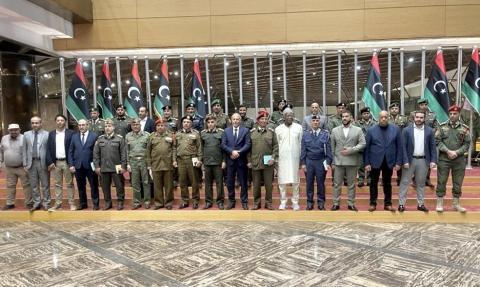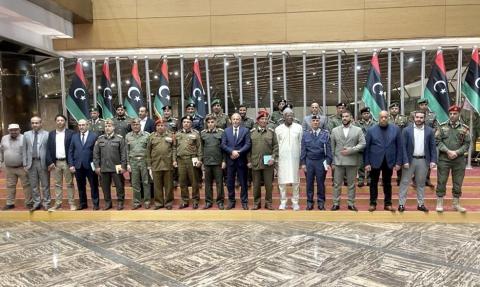
After nearly three years of fierce war in eastern and southern Libya, the Libyan National Army, led by Field Marshal Khalifa Haftar, breathed a sigh of relief and entered a new phase.
Now, the army is focusing of the two largest cities after Benghazi – Tripoli and Misrata – which are home of dangerous militias, extremist groups and modern weapons.
Haftar is counting on the military to work under the umbrella of the army, in order to avoid clashes, destruction and fighting. In this regard, Army spokesperson Brigadier General Ahmed al-Mesmari told Asharq Al-Awsat that contacts were underway to avoid such a fate.
He said that the key to the entry of the army into Tripoli would start from the town of Zawia, west of the capital, and that there would be no fighting in Misrata.
“We have given a six-month deadline so that politicians can resolve their differences,” he stressed.
“The deadline expires in March. After that we will have a word to save the country.”
On whether Haftar would accept assuming the presidency of the state based on popular demand, Mesmari said: “There are no objections… And certainly this demand came from suffering and our mission is to end these suffering.”
Libya’s army has been devastated and divided since the NATO campaign in support of the demonstrations to oust longtime leader Moammar al-Gadhafi.
In 2014, Haftar announced the “Dignity Battle” to reunite the army and fight extremist groups. Despite an international ban on arming his forces, the commander has been able to expel extremists from large parts of the country, especially in the east.
His entry into the capital and the powerful city of Misrata remains suspended, but there appears to be a plan in the works.
According to Mesmari, regaining control over Tripoli would begin with the town of Zawia.
Forces loyal to the head of Libya’s Presidential Council, Fayez al-Sarraj, are currently fighting other rival groups to spread their influence over the city.
“We are now working to establish the Supreme Council of the Armed Forces General Command, and the Supreme Security Council, as well as to integrate the military bodies in Tripoli and Benghazi into one system,” Mesmari said.
Asked about the steps that would be taken by the army if divisions persisted, the Libyan official replied firmly: “We have given a six-month deadline for the politicians to resolve their differences. The deadline expires in March and then we will have a word to save the country... Citizens believe that the security of Libya is achieved by the army.”
As for the next measures to be taken if the deadline ended without a resolution, Mesmari did not rule out a military option.
“If the army is forced to assume political responsibility by itself, it will be a burden, but it is necessary. If there are general demands that Haftar take over the helm of the state, there will be no objection,” he explained.
In the victories of the army in the eastern and southern regions, Mesmari finds solace for those who sought in difficult circumstances to liberate Benghazi from the clutches of extremists.
“The battle has, for now, lasted about four consecutive years. It was initially a tactical battle inside Benghazi. It was very difficult,” he recalled.
He noted that the abundance of military equipment owned by terrorist groups in Benghazi was the result of a large alliance between al-Qaeda and the Muslim Brotherhood.
“ISIS appeared in 2014, and they all fought the armed forces,” he said.
As for the way in which the army plans to enter the capital peacefully, Mesmari explained: “In recent months, after the battles of Sabratha, Zuwara, and others in the west of Tripoli, we have managed to separate the battle of western Tripoli from Tripoli itself.”
Regarding the army’s entry into the city of Misrata, he added: “By God’s will, there will be no fighting either… It is a national Libyan city that was kidnapped. Now the national movement has started to work actively. I salute the nationalists in Misrata, where operations have started against terrorism and terrorists. We highly value this.”
Troops have moved into Misrata in the past weeks and launched a massive campaign against militant groups, seizing weapons and explosives.
“Through these powerful actions against extremist groups, Misrata has contributed to the decline in terrorist operations in Benghazi,” Mesmari noted.












